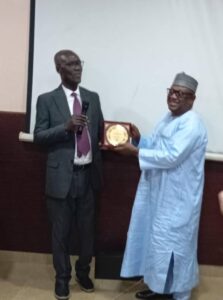Maureen Aguta
The Executive Secretary/CEO, Nigerian Shippers’ Council (NSC), Barr Pius Akutah, said low adoption of modern technology in port operations is hindering operational efficiency and transparency.
Speaking at the recent annual Seminar for Maritime Journalists in Lagos, organized by First Mediacon Network and Shippers’ Council; he disclosed that the NSC is tasked with promoting the digitalization of port processes, but challenges such as inadequate internet infrastructure, resistance to change among stakeholders, and a lack of skilled personnel in the tech field is hindering progress in this area.
Akutah who was represented by the NSC’s Director, in-charge of Special Duties, Mustapha Zubairu, noted that the absence of a port economic regulator from 2006-2014 when the private sector took over the operations of terminals had left the ports without a regulator, “and they all set their tariffs which determined their standard of service deliveries regardless of whether it meets the industry quality standard or not.”

Akutah emphasised the need for a strong legal framework for the Council as it is the nation’s Port Economic Regulator.
Speaking on political interference and bureaucracy, he said changes in government, shifting political priorities, and bureaucratic hurdles delays/disrupt the implementation of policies meant to improve port operation.
The ES said Nigerian ports have poor infrastructure, including outdated cargo handling equipment, inadequate road networks, and insufficient storage facilities.
Other challenges he listed include lack of coordination among stakeholders, high cost of doing business, port congestion and inefficiency, limited private sector participation, security and corruption issues.
Akutah for said that NSC is an agency constantly in transition which has transited from being an agency primarily responsible for protecting the interest of shippers on matters relating to international trade transaction, to trade facilitator, through the promotion of the development of Inland Dry Ports (IDPs) and other cargo logistics across the 6 geo-economic zones in Nigeria, he recommended that passing the Port Economic Regulatory Agency bill, implementing Cargo Tracking Note, operating a National Single Window, implementing an Enterprise Management System, digital transformation and E-Commerce, Public-Private Partnerships (PPP), regional trade expansion, sustainability of the global shipping industry and Green Shipping will go a long way in solving the problems faced by the Council.
“The tasks of correcting the service providers to comply with the standard rules have become an issue which NSC is still battling with up till now.
“There is an urgent need for the passage of the Nigerian Shipping and Port Economic Regulatory Agency Bill 2023 which seek to repeal the Nigerian Shippers’ Council Act and establish a regulatory agency for the Nigerian ports.
“The NSC’s ability to drive reforms and improve port operations is constrained by the broader infrastructural deficiencies within the port system.
“Effective port regulation requires close coordination between the NSC, the NPA, customs, terminal operators, shipping companies, and other stakeholders. However, there is often a lack of synchronization among these entities, leading to inefficiencies, conflicting policies, and a fragmented regulatory environment.
“Changes in government, shifting political priorities and bureaucratic hurdles delays/disrupt the implementation of policies meant to improve port operations.
“High tariffs, port charges, and inefficiencies at the ports increase the cost of doing business in Nigeria. While the NSC is responsible for overseeing tariff structures and pricing, it faces the challenge of balancing the interests of port operators, shippers, and the government while trying to make the ports competitive.
“Nigerian ports continue to struggle with congestion and inefficiency, despite efforts to streamline operations.
“While the NSC has the mandate to regulate and foster private sector involvement, there remains limited participation from private investors due to regulatory uncertainty, inadequate infrastructure, and challenges related to port security and safety, Security and Corruption Issues.
“Security challenges, including cargo theft, piracy, and general lawlessness, persist at Nigerian ports. These security risks negatively affect port operations and increase the cost of shipping. Additionally, corruption among port officials and stakeholders remains a problem, with illegal fees, bribery, and rent-seeking behavior complicating the NSC’s regulatory functions and undermining reforms,” Akutah said.
CEO, First Medicaon Network Ltd/Facilitator, Sesan Onilemo, disclosed that the 2024 edition of the seminar was tailored to educate maritime journalists and stakeholders on the issues affecting NSC.
“Currently, the rating of ease of doing business in the ports is low.
“This year, we deliberately narrowed-down our focus to a topic that can offer a dual opportunity for maritime journalists and content owners to acquire knowledge about the emerging dispensation at the NSC, and also understand the apprehension of direct stakeholders about The Nigerian Shipping and Port Economic Regulatory Agency Bill 2023, which is in the last stage of being enacted.
“I appeal to other agencies and players in the Nigerian maritime industry to emulate the golden initiative of the NSC and join us to espouse capacity building for maritime journalists and content owners,” Onilemo said.


